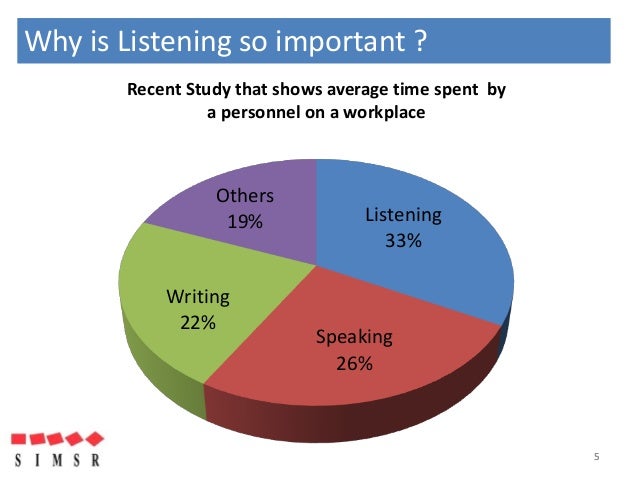Listening is a very important aspect of being able to
communicate with others. The importance of listening extends far beyond
academic and professional settings. Understanding how to practice good
communication even in your day to day life, among friends, family, and
significant others, is important for a number of reasons: fostering good
self-esteem, maximizing productivity and getting better grades in school,
improving relationships, and even becoming a better speaker. Studies have also
shown that speaking raises blood pressure, however listening actually lowers
blood pressure.
The listening process involves 5 different steps: (taken directly from the Communication Blog - http://tcbdevito.blogspot.com/2011/04/communication-strategies-listening.html)
1. Receiving -
The first stage in the process of listening is receiving the message. At this
stage you listen not only to what is said (verbally and nonverbally) but also
to what is omitted. You receive, for example, your boss’s summary of your
accomplishments as well as the omission of your shortcomings or, perhaps, vice
versa.
2. Understanding -
The second stage of listening is understanding the message. That is, after
receiving the message, you process it and try extract the meaning from the
message that the speaker wants you to come away with.
3. Remembering
- The third stage of listening is remembering the message. It would little help
to you if you received and understood the message but didn’t remember it. If
you want to remember what someone says or the names of various people, this
information needs to pass from your short-term memory (for example the memory
you use to remember a phone number just long enough to write it down) into
long-term memory (or relatively permanent memory).
4. Evaluating
- Once you’ve received, understood, and have the message in memory, you need to
evaluate it. After all, not all messages are equal, some are lies, and some are
truths. Some can be significant and some can be trivial. Some are constructive,
and on the other hand some are destructive.
5. Responding
- After you evaluate the message, you’re likely to respond in some way. And, of
course, a speaker expects a response. This step shows the speaker that you were
actually listening to what they were saying rather than just daydreaming. This is
particularly important in a work setting, especially if your boss or somebody
of upper management is the speaker.

You should really indicate what you are cutting and pasting directly from another document, and cite it. Even in a blog, that is just good form. Typically I do that by using the quote button that indents the segment of quoted text, and I always provide a citation or link to the source document. You don't want someone accusing you of plagiarism.
ReplyDelete